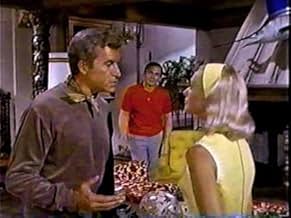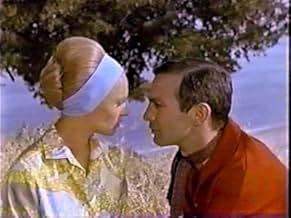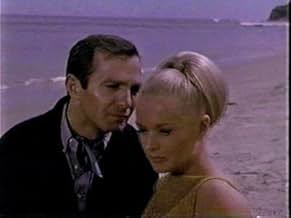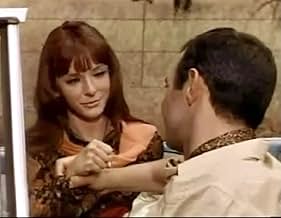अपनी भाषा में प्लॉट जोड़ेंThe doctor tells a successful lawyer that he is terminally ill and will die in less than two years.The doctor tells a successful lawyer that he is terminally ill and will die in less than two years.The doctor tells a successful lawyer that he is terminally ill and will die in less than two years.
- 8 प्राइमटाइम एमी के लिए नामांकित
- 12 कुल नामांकन
एपिसोड ब्राउज़ करें
फ़ीचर्ड समीक्षाएं
I loved this series and I am very disappointed that since it got cancelled on NBC in 1968 I have not been able to find this show anywhere.
Today is August 4th, 2019, and I still have not found this show on any TV network or on any streaming service or even online.
If you ever do find this show available for viewing in any form and anyplace please share this info here. I would love very much to watch all these episodes again.
This show ran from 1965 till 1968, and there were 85 episodes in total.
Thank you in advance.
At one time, TV shows occasionally had an interesting premise. This one's a variant on the question of what you'd do if you had the means and perhaps the time. Time, though, this character doesn't have, and the threat of death is probably what gives the series its focus and urgency. "To cram thirty years of living into one or two" is the voiced-over premise at the start of an episode; we would all do well to remember it at the start of a day, and live as though it's the last one, not recklessly but deliberately.
"Run for Your Life" was one of those shows that Johnny Carson loved to joke about, back in the sixties; with the premise that a wealthy 30-ish lawyer had a fatal disease with only one or two years left to live, when the show entered it's third season, did this mean the specialists were quacks, or that the hero's globe-trotting adventures invoke some 'miracle cure'?
The joking aside, the series' novel premise gave star Ben Gazzara an opportunity to display his well-respected dramatic skills (he'd created the role of Brick in "Cat on a Hot Tin Roof" on Broadway, and, with Peter Falk, would make a major impact in John Cassavetes' innovative films of the sixties and seventies), and turn the routine plots into often engrossing character studies.
There could never be a truly 'happy' end to any episode; even when 'Paul Bryan' resolved the issues raised in a show, he could never enjoy the 'fruits' of his endeavors, or even promise to return to the people whose lives he'd changed. If he fell in love (which, naturally, happened), he had to either deny it, or pass the reciprocated love to someone else (unless the girl herself died), so 'bittersweet' was the best term to describe the show, a quality similar to "The Fugitive", as well.
As NBC required 'action' in their series, "Run for Your Life" had Bryan often "in harm's way", and each time he was treated by a doctor or hospital, there was the added tension of whether his exertions might accelerate his disease. Gazzara's Bryan was not trying to commit suicide, but was trying to live his remaining time to the fullest, so his anguish when facing risks had a very 'real' basis, and gave Gazzara some of his best series' moments.
Despite the 'backlot' feel of the 'international' locales (the show never went on location), and the casting of the same actors who appeared in many other Universal-produced series of the period, veteran producer Roy Huggins tried to keep each episode fresh and original, through the use of stock footage, music, and clever editing.
"Run for Your Life" was not a 'great' series, but was unconventional for it's time, and, as a showcase for Ben Gazzara, was definitely worth watching.
The joking aside, the series' novel premise gave star Ben Gazzara an opportunity to display his well-respected dramatic skills (he'd created the role of Brick in "Cat on a Hot Tin Roof" on Broadway, and, with Peter Falk, would make a major impact in John Cassavetes' innovative films of the sixties and seventies), and turn the routine plots into often engrossing character studies.
There could never be a truly 'happy' end to any episode; even when 'Paul Bryan' resolved the issues raised in a show, he could never enjoy the 'fruits' of his endeavors, or even promise to return to the people whose lives he'd changed. If he fell in love (which, naturally, happened), he had to either deny it, or pass the reciprocated love to someone else (unless the girl herself died), so 'bittersweet' was the best term to describe the show, a quality similar to "The Fugitive", as well.
As NBC required 'action' in their series, "Run for Your Life" had Bryan often "in harm's way", and each time he was treated by a doctor or hospital, there was the added tension of whether his exertions might accelerate his disease. Gazzara's Bryan was not trying to commit suicide, but was trying to live his remaining time to the fullest, so his anguish when facing risks had a very 'real' basis, and gave Gazzara some of his best series' moments.
Despite the 'backlot' feel of the 'international' locales (the show never went on location), and the casting of the same actors who appeared in many other Universal-produced series of the period, veteran producer Roy Huggins tried to keep each episode fresh and original, through the use of stock footage, music, and clever editing.
"Run for Your Life" was not a 'great' series, but was unconventional for it's time, and, as a showcase for Ben Gazzara, was definitely worth watching.
10kinetica
Ah the adventure this presented when viewed at the tender age of 3 or 4.
My classmates always called me "Austin" and other impolite variations of the bionic man, yet they did not know back then about the TV i watched before i met them. Now it is of little consequence; and so this is a show that i regard fondly. As seen through the experience of a 4 yr old this tv show was very exciting for it's day. Long before i knew of politics and history this show was fun to watch and get involved with. After 40yrs TV is and may never be so fun to watch as the shows of my childhood, the media may operate the same but my perception as influenced by education simply makes todays TV mundane and "directed"; Oh how advanced communication techniques jaded this boy to whom days of the week passed like an eternity unto themselves. Now I am sketchy as to the star.... I am thinking Ben Gazara, but I think it might have been Christopher George... I am very glad for IMDB: It provides me the access to my early memories, that 100 years ago would not have been possible. Here is another example I implore those who read these words and have the resources to make this show available, to do so in a historical style, with accuracy and full preservation of the original broadcast and even perhaps the "extra" perks we can in todays tech employ and excavate the treasures of a generation who were so filled with joy at these daily events.
My classmates always called me "Austin" and other impolite variations of the bionic man, yet they did not know back then about the TV i watched before i met them. Now it is of little consequence; and so this is a show that i regard fondly. As seen through the experience of a 4 yr old this tv show was very exciting for it's day. Long before i knew of politics and history this show was fun to watch and get involved with. After 40yrs TV is and may never be so fun to watch as the shows of my childhood, the media may operate the same but my perception as influenced by education simply makes todays TV mundane and "directed"; Oh how advanced communication techniques jaded this boy to whom days of the week passed like an eternity unto themselves. Now I am sketchy as to the star.... I am thinking Ben Gazara, but I think it might have been Christopher George... I am very glad for IMDB: It provides me the access to my early memories, that 100 years ago would not have been possible. Here is another example I implore those who read these words and have the resources to make this show available, to do so in a historical style, with accuracy and full preservation of the original broadcast and even perhaps the "extra" perks we can in todays tech employ and excavate the treasures of a generation who were so filled with joy at these daily events.
...that of not just the adventures of a dying man with only a year or two to live, but also make him rich and playboy handsome, and even though he's doomed by illness, bless him with otherwise relative good health so as to be symptom-free until the very end, and with that, set him free upon the world to basically go wherever he wants and do there whatever he wants. Okay. I'll bite.
I watched this show without fail during its first season, each and every episode-- 30 in all. It had everything a teenage boy of that era might like, hot women, hot cars and exotic places; every week the dying hero falls in love with a beautiful babe, while living life to the fullest possible extent. That it's all being enjoyed by a dying man, Paul, played by Ben Gazzara, at first only subtly and slightly puts a damper on all the fun. Hey, there's a lot to experience! But, to me, eventually, i.e., by the second season, the maudlin aspect of it all began to seriously undermine the enjoyability of the show. Who wants to be constantly reminded of the unrelenting imminence of death? By season 2 something had changed, maybe it was me, but for some reason I no longer liked the show.
Thinking back on it, in a way, the show is a lot like another 60s show, Route 66. If you take out the Corvette and the buddy, and inject the dying man conceit.
8 Stars for the inspired idea and for the 60s nostalgia
I watched this show without fail during its first season, each and every episode-- 30 in all. It had everything a teenage boy of that era might like, hot women, hot cars and exotic places; every week the dying hero falls in love with a beautiful babe, while living life to the fullest possible extent. That it's all being enjoyed by a dying man, Paul, played by Ben Gazzara, at first only subtly and slightly puts a damper on all the fun. Hey, there's a lot to experience! But, to me, eventually, i.e., by the second season, the maudlin aspect of it all began to seriously undermine the enjoyability of the show. Who wants to be constantly reminded of the unrelenting imminence of death? By season 2 something had changed, maybe it was me, but for some reason I no longer liked the show.
Thinking back on it, in a way, the show is a lot like another 60s show, Route 66. If you take out the Corvette and the buddy, and inject the dying man conceit.
8 Stars for the inspired idea and for the 60s nostalgia
क्या आपको पता है
- ट्रिवियाSome sources claim that Ben Gazzara's character suffered from leukemia. However, in a 1998 interview conducted by television book writer Ed Robinson, Executive Producer Roy Huggins indicated that the affliction from which "Paul Bryan" suffered was never mentioned on the program and does not exist.
- भाव
Opening credits narrator: [season 3 opening credits] Paul Bryan, Attorney at Law, future full of promise. Until a medical examination reveals he has a short time to live, precious time, time to be used, time to crowd 30 years of living into one... or two.
- क्रेज़ी क्रेडिटDuring seasons one and two, Roy Huggins was credited as Executive Producer during the opening credits after the program's episode titles. During season three, for unknown reasons, Huggins was not clearly credited as Executive Producer. In addition, Huggins was nominated for an Emmy as Executive Producer for the show's final season. The end credits state the following: A Roncom Films-Roy Huggins Production.
- कनेक्शनReferenced in Mystery Science Theater 3000: The Starfighters (1994)
टॉप पसंद
रेटिंग देने के लिए साइन-इन करें और वैयक्तिकृत सुझावों के लिए वॉचलिस्ट करें
- How many seasons does Run for Your Life have?Alexa द्वारा संचालित
विवरण
- रिलीज़ की तारीख़
- कंट्री ऑफ़ ओरिजिन
- भाषा
- इस रूप में भी जाना जाता है
- Wettlauf mit dem Tod
- फ़िल्माने की जगहें
- उत्पादन कंपनियां
- IMDbPro पर और कंपनी क्रेडिट देखें
इस पेज में योगदान दें
किसी बदलाव का सुझाव दें या अनुपलब्ध कॉन्टेंट जोड़ें




































